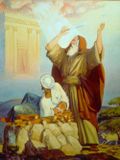Know Your Neighbor…Eid al-Adha
 A couple of days ago, I came back from India by way of Amman, Jordan, and took a cab to cross the border at the Allenby border crossing. I was held up for two hours at the border because of large crowds. Unbeknownst to me, it was a few days before one of the most important Muslim holidays, Eid al-Adha.
A couple of days ago, I came back from India by way of Amman, Jordan, and took a cab to cross the border at the Allenby border crossing. I was held up for two hours at the border because of large crowds. Unbeknownst to me, it was a few days before one of the most important Muslim holidays, Eid al-Adha.
I'm a little embarassed to admit that despite my interest and involvement in interfaith activities, I was not aware this holiday was this week, and furthermore when I heard there was a Muslim holiday this week I had no idea what holiday, and when I first read what holiday I had no idea what the holiday was about.
In America, a country where 2% of the population is Jewish, the vast majority of Christians are at least familiar with the basic idea of Chanuka. But here I live in a country where 20% of the population is Muslim and I'm pretty ignorant about one of their most important holidays — and I suspect I'm more the rule than the exception in this regard compared to my fellow Israeli Jews. OK, the Christians have a reason to know about Chanuka — after all the story appears in their Bible…but actually, the story of Eid al-Adha also appears in MY Bible!
For full details, click on the above link to the Wiki entry on the holiday. "B'kitzur," the holiday commemorates Ibrahim's (Abraham's) willingness to sacrifice his son. Interestingly, while most Muslims say that it was Ishmael Abraham was willing to sacrifice, the Koran does not specify: it just says "his son." There are some Muslim opinions (admittedly minority ones) that hold it was Isaac Abraham was willing to sacrifice. The holiday is observed right after the hajj, the time of pilgramage to Mecca, and about 70 days after Ramadan.
Jews also have a holiday commemorating this event: Rosh Hashanah, the Jewish New Year. We have so much other stuff going on that same day — the creation of the world (or at least the sixth day of creation, the creation of people), the day of judgment — that we are not as focused on this aspect of the holiday. But we clearly commemorate it. One of the reasons we blow the shofar on Rosh Hashanah is as a reminder of the ram that was offered in the place of Abraham's son.
There is an interesting link from Rosh Hashanah to Islam. Our Torah reading on Rosh Hashanah is about God remembering Sarah, and the expulsion of Hagar and Ishmael. Islam tells that same story — and says that where Hagar and Ishmael were expelled to was Saudi Arabia. Once there, Hagar was content to allow Ibrahim to return to Canaan, as she was content that God would take care of her.
Muslims and Jews alike see the event we call "akedat Yitzchak," the binding of Isaac, as one of the great tests that Abraham withstood. Since the word Islam itself means "submission," as in submission to God's will, I wonder if Muslims struggle as much with how Ibrahim could have been willing to sacrifice his son as we Jews do? Would be a great topic for an interfaith discussion.
Muslims observe the holiday the same way Jews observe many of their holidays: dress nicely, go to the place of prayer, eat a special meal, get together with friends and family, give charity.
To any Muslim readers out there, Eid Mubarak! Kul 'am wa enta bi-khair!"
Reb Barry

So, Rabbi, how will we ever know which son Abraham was willing to sacrifice…..Isaac or Ishmael ?